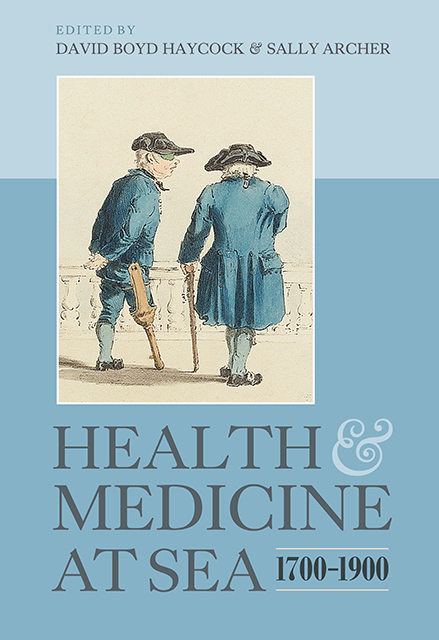Book contents
- Frontmatter
- Contents
- List of Figures and Tables
- Preface
- List of Contributors
- Acknowledgements
- List of Abbreviations
- Introduction Health, Medicine and the Maritime World: A History of Two Centuries
- 1 ‘The Intention is Certain Noble’: The Western Squadron, Medical Trials, and the Sick and Hurt Board during the Seven Years War (1756–63)
- 2 Royal Navy Surgeons, 1793–1815: A Collective Biography
- 3 Surgery in the Royal Navy during the Republican and Napoleonic Wars (1793–1815)
- 4 The Sick and Hurt Board: Fit for Purpose?
- 5 An ‘Important and Truly National Subject’: The West Africa Service and the Health of the Royal Navy in the Mid Nineteenth Century
- 6 Mortality and Migration: A Survey 128
- 7 Slave Purchasing Strategies and Shipboard Mortality: Day-to-Day Evidence from the Dutch African Trade, 1751–1797
- 8 Ships, Families and Surgeons: Migrant Voyages to Australia in the Age of Sail
- 9 Medical Encounters on the Kala Pani: Regulation and Resistance in the Passages of Indentured Indian Migrants, 1834–1900
- Bibliography
- Index
3 - Surgery in the Royal Navy during the Republican and Napoleonic Wars (1793–1815)
Published online by Cambridge University Press: 07 March 2023
- Frontmatter
- Contents
- List of Figures and Tables
- Preface
- List of Contributors
- Acknowledgements
- List of Abbreviations
- Introduction Health, Medicine and the Maritime World: A History of Two Centuries
- 1 ‘The Intention is Certain Noble’: The Western Squadron, Medical Trials, and the Sick and Hurt Board during the Seven Years War (1756–63)
- 2 Royal Navy Surgeons, 1793–1815: A Collective Biography
- 3 Surgery in the Royal Navy during the Republican and Napoleonic Wars (1793–1815)
- 4 The Sick and Hurt Board: Fit for Purpose?
- 5 An ‘Important and Truly National Subject’: The West Africa Service and the Health of the Royal Navy in the Mid Nineteenth Century
- 6 Mortality and Migration: A Survey 128
- 7 Slave Purchasing Strategies and Shipboard Mortality: Day-to-Day Evidence from the Dutch African Trade, 1751–1797
- 8 Ships, Families and Surgeons: Migrant Voyages to Australia in the Age of Sail
- 9 Medical Encounters on the Kala Pani: Regulation and Resistance in the Passages of Indentured Indian Migrants, 1834–1900
- Bibliography
- Index
Summary
I say that where the learned physician is not to be had, be it either by sea or land, far or near, I will then use all honest and lawful means, both in physic and surgery, to the utmost of my knowledge and skill, before I will in any way permit and suffer my patient to perish for want of all help.
William Clowes, ‘A Right Fruteful and Approoved Treatise’ (1602)In 1540 Henry VIII granted a charter that joined the Surgeons’ Guild and the Company of Barbers. William Clowes (1543/4–1604) – one of the most eminent, innovative and controversial members of this amalgamated Barber-Surgeons Company – served as a military and naval surgeon from 1563to 1588, and he constantly strove to improve the low standards of surgical treatment that he observed in the services. But over two hundred years later, there still remained concerns over the standard of surgery in Britain's armed forces. Three months after the Battle of Camperdown in October 1797, John Bell, a master Edinburgh surgeon serving at the naval hospital at Yarmouth, composed a ‘memorial’ to the Right Honourable Earl Spencer, First Lord of the Admiralty, in which he expressed his concern at the low state of surgical practice and the poor training of many naval surgeons. A large part of the document was a plea for a military school of surgery; just as important, however, was a commentary on the plight of contemporary naval surgeons. ‘To the life of a navy surgeon there are, God knows, no seductions’, Bell wrote. ‘Nor will men ever delight in a profession which is not made respectable, honourable, and useful.’ Reflecting on the under-provision of surgeons, he continued:
Perhaps in the whole fleet there are few Surgeons Mates, not one may be, who is able to perform the greater operations of surgery. It has happened, that, after the most earnest entreaties of the Officers, of the Surgeon, of everyone concerned, a ship of the line has gone into battle without one assistant on board; no, not one to screw a tourniquet, to tie an artery, to hold a shattered stump, to put a piece of lint to a bleeding wound!
- Type
- Chapter
- Information
- Health and Medicine at Sea, 1700-1900 , pp. 63 - 89Publisher: Boydell & BrewerPrint publication year: 2009

